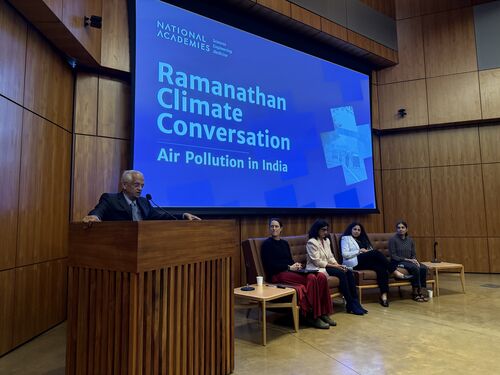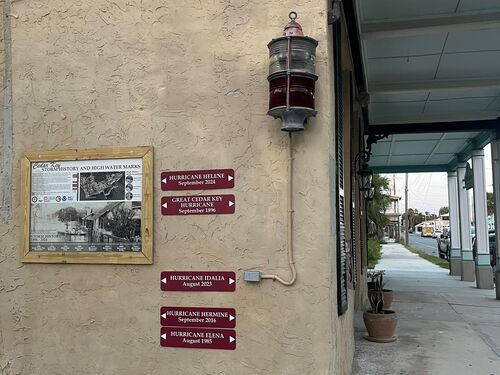Gulf Research Program Awards $5.9 Million to Increase Understanding of the Effects of Climate Change on Environmental Hazards in Overburdened Communities
Program News
By Pete Nelson
Last update August 15, 2023
WASHINGTON ― The Gulf Research Program (GRP) of the National Academies of Sciences, Engineering, and Medicine has awarded $5.9 million to support four projects that will advance the understanding of climate change effects on local health disparities. Collectively, these projects will create a series of models to better understand how environmental hazards influence human health outcomes and how those hazards will be affected by climate change under varying scenarios and time frames.
“Most models and data information products that identify vulnerable areas overburdened by pollution and susceptible to increased climate hazards are typically built on national datasets with limitations in data quality, coverage, and scale resolution,” said Daniel Burger, senior program manager of the GRP’s Gulf Health and Resilience Board. “These awarded projects offer an opportunity to develop more robust models that incorporate localized data that enable community stakeholders, planners, and decision-makers to fully understand current and future health risks to make the best decisions for their communities.”
Adverse conditions such as extreme heat, sea-level rise, flooding, and extreme weather events are occurring more frequently and simultaneously, often interacting with non-climatic risks that threaten human health and well-being, such as heat-related stress and air and water pollution. Communities overburdened by these non-climatic risks are likely to experience more intense health impacts from climate change as adverse conditions compound, resulting in greater health disparities when compared to communities less exposed to environmental hazards. These disparities are particularly relevant to flood-prone communities in proximity to oil, gas, and petrochemical facilities such as those located along the U.S. Gulf Coast.
The GRP will fund the following projects:
Mapping Local Climate Change-Attributable Health Burdens
Award Amount: $1,500,000
Project Director: Christopher Uejio (Florida State University)
Project Team Affiliations: Colorado University Boulder, Florida State University, Tulane University
Project Summary:
Climate change is adversely impacting human health and is projected to exacerbate environmental exposures from extreme heat, air pollution, and tropical cyclones/hurricanes. Overburdened communities often face higher environmental exposure levels, have preexisting health conditions that increase the risk of adverse outcomes, and have lower financial capacity to respond to and recover from exposures and disasters. The project’s overarching goal is to investigate and model interactions of neighborhood-level environmental hazards. The study will infer climate-attributable health outcomes that will be synthesized into a cumulative risk map to summarize environmental health disparities by zip code. Working with regional planning councils, a social survey will prioritize future time periods and health disparities and streamline the translation and communication of the project’s outputs (e.g., data formats, story maps). The project will build local government capacity to understand the strengths and limitations of environmental exposures and climate projections, and provide insight into health disparities.
Climate-LEAD: Climate Effects on Localized Environmental Health Disparities in Overburdened Texas Communities Along Gulf Coast
Award Amount: $1,499,990
Project Director: Lei Zou (Texas A&M University)
Project Team Affiliations: Texas A&M University, Texas Water Resource Institute
Project Summary:
This project will develop fine-scaled databases, models, and tools to predict near-, mid-, and long-term impacts of climate change-intensified air pollution and water insecurity on health disparities in overburdened Texas communities along the Gulf Coast. Southeast Texas communities have long borne the brunt of poor localized air and water quality, partially due to emissions from petrochemical facilities and frequent coastal hazards. Ongoing climate change will cause more extreme events, exacerbating environmental hazards and health crises in these already overburdened communities. This necessitates an urgent effort to quantify future environmental health disparities under climate change in these communities to inform mitigation strategies. The databases, models, webGIS, and strategies produced through this project will guide stakeholders to strengthen health resilience to environmental hazards under climate change.
Using Climate Scenarios to Inform Public Health Planning in Overburdened Communities in Florida and Mississippi
Award Amount: $1,482,900
Project Director: Andrew Rumbach (Urban Institute)
Project Team Affiliations: Stony Brook University, Urban Institute
Project Summary:
Climate hazards like heat waves and hurricanes are associated with negative public health outcomes, but local governments, health care providers, and emergency managers in overburdened communities often have inadequate tools to proactively plan for them, especially with the uncertainties of climate change. This project will develop a unique framework, at the intersection of climate and health, that will allow overburdened communities in Florida and Mississippi to develop robust public health strategies aimed at reducing negative health outcomes due to climate hazards and addressing treatment capacity at emergency rooms and hospitals. This project will model the empirical relationships between health and extreme events by combining datasets on hospital admissions, emergency room visits, and extreme climate events in the two states and collect qualitative data in four case study communities. The project will create an online, customizable data visualization and scenario planning tool that draws on these climate and health models. We will then collaborate with key stakeholders in the four case study communities to host scenario planning workshops that envision climate health adaptation pathways. A scenario planning guide will allow other overburdened communities to replicate these analyses and workshops.
Assessing the Public Health Risk Due to Tropical Cyclone Impacts on Petrochemical Facilities
Award Amount: $1,492,014
Project Director: Boniface Fosu (Mississippi State University)
Project Team Affiliations: Columbia University, Rice University
Project Summary:
Natural disasters have long overburdened communities along the U.S. Gulf Coast. Among them, tropical cyclones (TCs) are the most consequential. Direct hazards from TCs include high winds, heavy rains, and storm surges, but TCs can also beget other equally destructive hazards. The latter include petrochemical spills from aboveground storage tanks (ASTs), which are critical infrastructure to the Gulf region’s oil and gas industry. The communities that are most affected by TCs and petrochemical spills remain among the poorest nationwide and, to this day, lack the capacity to deal with the plethora of health, environmental, and socioeconomic consequences that have traditionally followed in their wake. Climate change is expected to exacerbate existing TC hazards, thus raising the specter of more intense storms, leading to more frequent severe spills. What remains unknown is the potential extent of these spills and their human health outcomes. We propose a modeling framework that will allow us to discern the spill dynamics for ASTs and their human health implications in response to TC hazards, both in the current climate and under plausible scenarios of future carbon emissions.
The National Academies’ Gulf Research Program is an independent, science-based program founded in 2013 as part of legal settlements with the companies involved in the 2010 Deepwater Horizon disaster. It seeks to enhance offshore energy system safety and protect human health and the environment by catalyzing advances in science, practice, and capacity to generate long-term benefits for the Gulf of Mexico region and the nation. The program has $500 million for use over 30 years to fund grants, fellowships, and other activities in the areas of research and development, education and training, and monitoring and synthesis.
The National Academies of Sciences, Engineering, and Medicine are private, nonprofit institutions that provide independent, objective analysis and advice to the nation to solve complex problems and inform public policy decisions related to science, engineering, and medicine. They operate under an 1863 congressional charter to the National Academy of Sciences, signed by President Lincoln.
Contact:
Pete Nelson, Director of Communications
Gulf Research Program
PNelson@nas.edu
More like this
Discover
Events
Right Now & Next Up
Stay in the loop with can’t-miss sessions, live events, and activities happening over the next two days.
NAS Building Guided Tours Available!
Participate in a one-hour guided tour of the historic National Academy of Sciences building, highlighting its distinctive architecture, renowned artwork, and the intersection of art, science, and culture.




